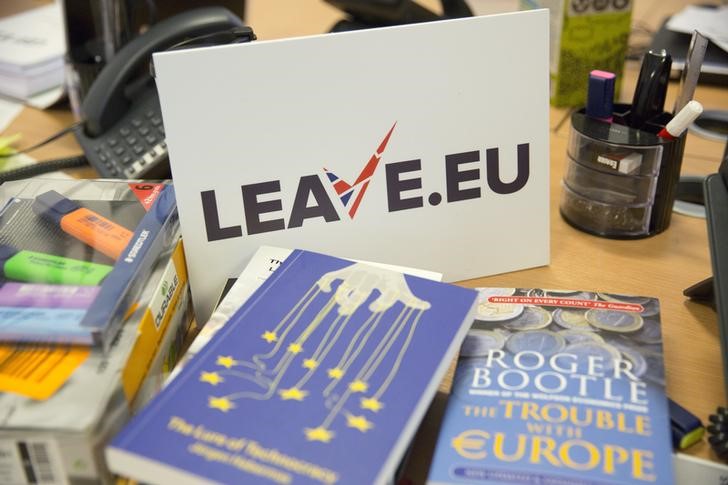(Bloomberg) -- As far as Brexit headaches go, Barclays PLC’s (LON:BARC) (NYSE:BCS) John McFarlane says that while his bank is on top of job relocations, he’s more concerned about rewriting “hundreds of thousands” of contracts.
He’s not alone. Andrew Bailey, head of the U.K. Financial Conduct Authority, said “contract continuity” is among the biggest potential disruptions in a no-deal, no-transition Brexit. Both Bailey and McFarlane, who also chairs London’s banking lobby, testified before lawmakers Wednesday. Bank of England Governor Mark Carney and European Central Bank President Mario Draghi have also expressed concern about the issue and the lack of time left for a fix.
A week ago, data from the European Banking Authority showed the scope of the issue, and that money is already on the move for that reason. European banks have slashed their U.K. assets by $425 billion, driven by a 35 percent drop in derivatives exposures. Insurance policies are affected too, with Carney saying that about 20 billion pounds ($26.9 billion) of insurance liabilities in Britain could be affected without swift action.
The issue arises because one side or the other of a contract can meet its obligations only thanks to an authorization that’s set to disappear once the U.K. leaves the European Union in 2019. That may result in a firm being obliged by contract to do something that regulation forbids. Impossibility generally doesn’t work as a defense against non-fulfillment of a contract, said Simon Gleeson, a regulatory partner at Clifford Chance LLP in London.
“A bank which enters into a contract which becomes illegal to perform by reason of Brexit may well be liable in damages for its non-performance to the counterparty,” said Gleeson. “Dealing with this is so much in everyone’s interest that I’m amazed it hasn’t been addressed.”
McFarlane’s testimony on Barclays’s Brexit planning ranged from well-trodden ground on derivatives clearing to the details of shifting operations abroad. “The jobs lost are -- in a trade scenario -- they’re insignificant,” McFarlane said. “They’re not the most important thing. The most important thing is that we may have to repaper hundreds of thousands of contracts into the EU.”
An aggregate 1.28 trillion euros ($1.52 trillion) of bank assets, including loans, securities and derivatives, may need to be re-booked from the U.K. to the EU following a hard Brexit, unless alternative arrangements can be reached, according to a study carried out for the Association for Financial Markets in Europe, the lobby group for Europe’s wholesale financial markets.
Cross-border revolving credits -- credit lines that can be drawn down, repaid, then tapped again -- are among such contracts. Many are issued to EU companies by syndicates with members based in the U.K. For example, lenders to Volkswagen (DE:VOWG_p) Financial Services AG’s 2.5 billion-euro line include London-based entities for Bank of America Corp (NYSE:BAC). and Citigroup Inc (NYSE:C)., as well as the U.K. units of the major British banks, data compiled by Bloomberg show.
Lifecycle Events
A lender that lost its authorization but made an advance to the company under the revolver might find itself in breach of local law in jurisdictions including Germany and France, according to Clifford Chance. On the other hand, it might be in breach of contract if it fails to make the loan.
Andreas Hoffbauer, a spokesman for the Wolfsburg, Germany-based carmaker, declined to comment on the company’s preparations, calling the Brexit discussion “a hypothetical question.”
Derivatives present a different problem. Carney estimates 26 trillion pounds of uncleared, over-the-counter derivative contracts could be affected. Banks that lose authorizations may not be able to deal with “life-cycle events” affecting derivative contracts, such as rolling open positions, exercising options and compressing trades, according to the BOE.
Adding to the difficulties, regulators may require lenders to carry out actions -- such as so-called trade compression, which nets out offsetting positions -- that they are forbidden to do. Moving the contracts to unaffected entities requires time, consent from different parties and involves the courts.
Potential Solutions
As for insurance, when presenting the BOE’s Financial Stability Report on Tuesday, Carney estimated 6 million U.K. policyholders could be affected -- as well as 30 million European policyholders, with a separate 40 billion pounds of liabilities. Absent some agreement, insurers may be unable to collect premiums or pay out on liabilities, with contracts such as life insurance and employers’ liability that extend far into the future “particularly vulnerable,” according to the BOE.
“This is of particular concern to us,” said Malcolm Tarling, a spokesman for the Association of British Insurers in London.
Quizzed by lawmakers, Bailey laid out three possible ways of dealing with the continuity issue. One would be to write some arrangement preserving authorizations into the U.K.’s final exit agreement, he said. Another possibility would be for U.K. and EU legislators to act separately, but in parallel, the same course suggested by Carney.
The final option “which we would strongly advise not to follow,” is to leave firms to deal with it themselves, he said. “The problem with leaving firms to sort it out is that it is extremely disruptive, and there isn’t enough time to do it.”
